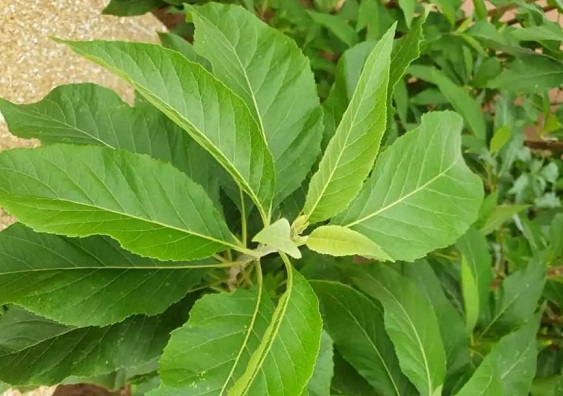Thailand medical scientists discover that extracts of Vernonia Amygdalina can induce apoptosis in certain cancer cell lines
Nikhil Prasad Fact checked by:Thailand Medical News Team Aug 20, 2024 1 year, 5 months, 3 weeks, 3 days, 12 hours, 17 minutes ago
Thailand Medical: A Promising Cancer Fighter from Nature
Cancer continues to be one of the most daunting challenges in modern medicine, claiming millions of lives every year. The search for more effective and less harmful treatments has led scientists to explore a wide array of natural compounds. Among these, the Vernonia amygdalina, commonly known as bitter leaf, is emerging as a promising candidate. A recent study conducted by researchers from several prestigious institutions in Thailand, including Chiang Mai University, Chulabhorn Graduate Institute (CGI) and the National Science and Technology Development Agency (NSTDA), has provided new insights into how this plant's leaf extract can induce apoptosis, or programmed cell death, in HeLa cells, a type of cervical cancer cell line. This
Thailand Medical news report delves into the details of this research and its implications for future cancer therapies.
 Thailand medical scientists discover that extracts of Vernonia Amygdalina can induce apoptosis in certain cancer cell lines
The Study and Its Purpose
Thailand medical scientists discover that extracts of Vernonia Amygdalina can induce apoptosis in certain cancer cell lines
The Study and Its Purpose
The research aimed to investigate the bioactive compounds within Vernonia amygdalina that contribute to its cytotoxic effects on cancer cells. Utilizing advanced metabolomics and proteomics approaches, the team identified the specific pathways through which these compounds induce apoptosis. The study findings show how Vernonia amygdalina could be developed into an effective cancer treatment.
Understanding Apoptosis: The Key to Cancer Treatment
Apoptosis, or programmed cell death, is a vital process that helps maintain healthy tissue by eliminating damaged or unnecessary cells. In cancer, this process is often disrupted, allowing abnormal cells to proliferate uncontrollably. The ability to restore apoptosis in cancer cells is a crucial aspect of many anti-cancer therapies. Vernonia amygdalina, with its rich composition of bioactive compounds, has shown potential in inducing apoptosis selectively in cancer cells, sparing healthy cells from damage.
Metabolomics and Proteomics: Unraveling the Complexities
The research team employed metabolomics and proteomics, cutting-edge techniques that allow for a detailed analysis of the chemical composition and protein pathways in biological samples. Metabolomics revealed that Vernonia amygdalina leaf extract contains 112 known metabolites, including alkaloids, phenolic compounds, and steroids. These compounds are known for their various therapeutic properties, including anti-inflammatory, antioxidant, and anti-cancer effects.
Proteomics further identified that the extract activates specific proteins associated with apoptosis, particularly in cancer cells. The study highlighted the roles of several key proteins, including c-Jun N-terminal kinases (JNK), p53, and caspase-9, which are integral to the apoptotic process.
Key Findings: Selective Cytotoxicity in Cancer Cells
The study's most significant finding was t
he selective cytotoxicity of Vernonia amygdalina leaf extract against HeLa cells. The extract's half-maximal inhibitory concentration (IC50) was found to be significantly lower in HeLa cells compared to normal Vero cells, indicating its potential for targeting cancer cells while minimizing harm to healthy tissue.
Among the metabolites identified, deacetylvindoline and licochalcone B stood out for their roles in inducing cytotoxicity. Deacetylvindoline, an alkaloid, is closely related to vinblastine and vincristine, both of which are well-established chemotherapy agents. Licochalcone B, a phenolic compound, is known for its anti-inflammatory and antioxidative properties, as well as its ability to induce apoptosis in cancer cells.
Proteomic Insights: Understanding the Mechanisms
The proteomic analysis revealed that exposure to Vernonia amygdalina leaf extract led to significant changes in the expression of proteins involved in apoptosis and stress response. Key pathways, such as the NF-κB pathway and the regulation of apoptosis, were notably activated. The study also identified the phosphatase and tensin homolog (PTEN) and X-box binding protein 1 (XBP1) as crucial regulators in the apoptotic process triggered by the extract.
Visualizing Apoptosis: Imaging and Protein Quantification
To further verify the apoptotic effects of Vernonia amygdalina leaf extract, the researchers employed advanced imaging techniques to observe changes in HeLa cells. The images revealed that the extract induced apoptosis more effectively than even some standard chemotherapy drugs like doxorubicin. The study also quantified the levels of apoptotic proteins using the Luminex® assay, confirming the significant increase in JNK, p53, and caspase-9 levels, all of which are markers of apoptosis.
Conclusion: A Step Toward Natural Cancer Therapies
The findings from this study suggest that Vernonia amygdalina leaf extract holds significant promise as a natural cancer therapy. Its ability to selectively induce apoptosis in cancer cells, while sparing normal cells, highlights its potential as a safer alternative to conventional chemotherapy. However, further research is needed to fully understand the mechanisms at play and to develop this extract into a standardized treatment option.
The study findings were published in the peer-reviewed journal: Pharmaceuticals.
https://www.mdpi.com/1424-8247/17/8/1079
For the latest medical research in Thailand, keep on logging to
Thailand Medical News.
Read Also:
https://www.thailandmedical.news/news/thailand-medical-researchers-leverage-3d-printing-to-produce-tablets-containing-mucuna-extract-to-treat-erectile-dysfunction
https://www.thailandmedical.news/news/thailand-medical-authorities-and-thai-fda-warns-against-contaminated-dietary-supplement-sold-on-facebook
